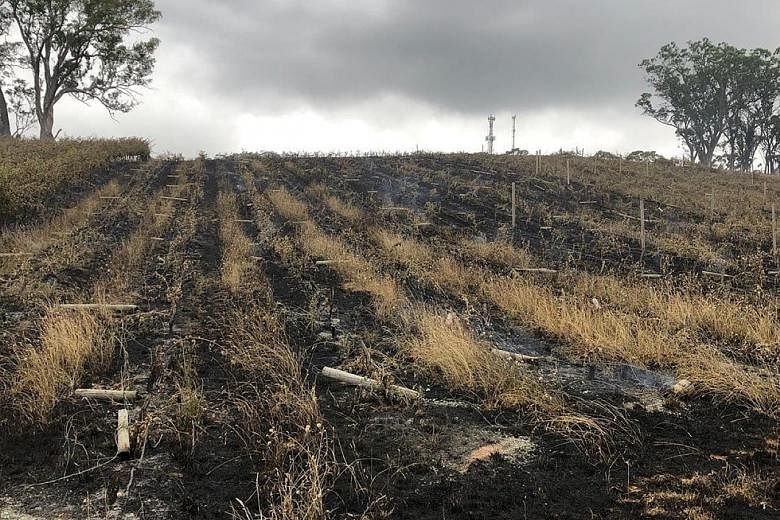At one of Australia's best-known wine producers, Tyrrell's Wines, the winemakers recently became concerned that the quality of the grapes may have been damaged by the thick bush fire smoke that has been enveloping much of south-eastern Australia for months.
Manager Bruce Tyrrell said the firm has decided not to use about 80 per cent of its crops in the Hunter Valley this year, enough to make about 840,000 bottles of wine. He said the decision was based on the proximity of the affected areas to the fires, the elevation of vineyards, and days in contact with fresh smoke.
"If the smoke taint is bad, the grape tastes like a dirty ashtray," he told The Sunday Times.
But the winemaker's troubles are far from unique, as the nation's worst-ever bush fires affect a vast range of businesses across all sectors of the economy.
Since September last year, the fires have left at least 33 people dead, destroyed more than 2,000 properties and razed more than 11 million ha. Estimates by most analysts of the potential economic cost range from A$5 billion (S$4.56 billion) to A$20 billion. The worst-hit sectors are likely to be tourism, agriculture and retail.
The fires have affected about 19,000 farmers who are facing potential losses of livestock in the hundreds of thousands, particularly sheep and cattle. Crop and dairy production have also been affected, prompting warnings that prices of fruit, vegetables and milk will rise.
The tourism sector has also been badly battered and is facing estimated losses of A$4.5 billion. The fires occurred during the busy holiday season across regional areas heavily reliant on domestic tourism. Meanwhile, international travellers were deterred by the global media coverage of the fires and the smoke.
Tourism Australia is running a A$20 million campaign - with the slogan "Holiday Here This Year" - to persuade Australians to travel domestically to support towns affected by fires. A separate A$25 million campaign is aimed at international travellers. The federal government has also started encouraging businesses to hold conferences and events in regional areas rather than in the capital cities.
"Many fire-affected regions still have the facilities to host both small and large-scale events," said Tourism Minister Simon Birmingham.
Most analysts believe the bush fires will shave up to 1 per cent off this year's gross domestic product.
"We only have to look to the constant smoke haze that our capital cities have been shrouded in over the last couple of months to see how this has changed the behaviour of people," Associate Professor Rebecca Cassells, an economist at Curtin University, told The Sydney Morning Herald on Friday.
"People are staying home, staying indoors and being told not to go to work. This means that they're less likely to be spending and less likely to be producing."
The retail sector is also set to suffer heavy losses, including food wholesalers which supplied affected areas and outdoor activity and camping outlets.
There has been a sharp drop in consumer sentiment since the fires started, according to the most recent Westpac-Melbourne Institute index. This is set to crimp household spending over the coming months. Several firms have already downgraded profits due to the bush fires.
Super Retail Group, which operates camping and outdoor wear stores, last month reported heavy declines in sales. "I think it will be the summer where Australians didn't go camping," its chief executive Anthony Heraghty told The Australian.
But the total impact of the fires on Australia's economy is still unclear, especially since the disaster is not yet over.

